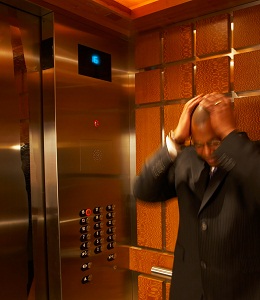Claustrophobia
 Claustrophobia is an extreme, irrational fear of small spaces, particularly of being trapped in small spaces. People with claustrophobia may have panic attacks if trapped in a small space, and may actively avoid situations that could activate claustrophobia.
Claustrophobia is an extreme, irrational fear of small spaces, particularly of being trapped in small spaces. People with claustrophobia may have panic attacks if trapped in a small space, and may actively avoid situations that could activate claustrophobia.
What Are the Symptoms of Claustrophobia?
The primary symptoms of claustrophobia are fear and panic associated with small, enclosed spaces in conjunction with a desire to avoid such spaces. Most people with claustrophobia are especially frightened by unfamiliar small spaces. For example, a person with claustrophobia might not be afraid of sitting in his or her own closet, but traveling in an elevator could be terrifying. People with claustrophobia might also be afraid of some small spaces but not others. For example, a small car might feel safe, while an elevator could activate a panic attack. Claustrophobia is one of the most common phobias and often co-occurs with anxiety and other phobias.
What Causes Claustrophobia?
Diagnosis of claustrophobia is made based on the expressed symptoms of the person. The precise cause of claustrophobia is unknown, but there appear to be several factors that increase the likelihood of developing claustrophobia. These include:
- Family members with a history of claustrophobia or other phobias. This may be due to early exposure to fear of small spaces, but could also indicate that phobias have a genetic basis.
- Traumatic experience such as being trapped in a car or locked in a closet.
- A diagnosis of an anxiety disorder.
- Witnessing frightening encounters with closed spaces, such as movies in which a person is buried alive.
Is There Treatment for Claustrophobia?
Claustrophobia, like most phobias, responds fairly well to treatment. Cognitive behavioral therapy and desensitization can be especially helpful. In cases of extreme claustrophobia, anti-anxiety medications such as Xanax can help reduce the symptoms enough to begin treatment and desensitization. Some people with phobias undergo hypnotherapy to reduce their phobic reactions, and a few sessions with a hypnotherapist can be highly effective in many patients with phobias.
References:
- American Psychological Association. (2009). APA concise dictionary of psychology. Washington, DC: American Psychological Association.
- Colman, A. M. (2006). Oxford dictionary of psychology. New York, NY: Oxford University Press.
Last Updated: 08-4-2015
- 3 comments
- Leave a Comment
-
Alice
October 4th, 2020 at 3:01 PMI do have the irrational fear of closed spaces and dark rooms . Its not due to an unfortunate incident or any trauma . Its unreasonable , I cannot put a reason to it . Might be genetic since my father and grandmother, both suffered the same fear .
-
Arturo M
October 6th, 2020 at 2:23 PMHello, Alice,
For years, I’ve also experienced claustrophobia. If you are looking for a therapist and find one that can specifically treat this condition, please share it.
Thank you,
Arturo -
Claustrophobia or Response to Trauma?
May 10th, 2021 at 10:57 AMWhen I was little, I loved small spaces. I used to run cables under things and through spaces my father could not fit, and, whenever I was at my grandparent’s house, I would play in between their couch and the wall. But then, in 6th grade, I got stuck in my school’s elevator, in between the 3rd and 4th floor, for 30 to 45 minutes, on a Saturday, all by myself. I panicked and pushed all the floor options. When nothing happened, I realized that the elevator was too far away from anyone to hear. I kept pushing the button for the 3rd floor, until the elevator went down to the 3rd floor and I got out. Ever since then, every time I even think about elevators, I get this feeling of a cold, clawed hand squeezing my heart and lungs, and it get’s very difficult to breathe. No one else in my family has any form of claustrophobia, and I’m fine in familiar small spaces(I don’t like unfamiliar ones because of my arachnophobia). Is it possible that my claustrophobia is a response because of a semi-traumatic experience(because it’s not the worst thing that I’ve had to deal with) and not actually a phobia at all? Because it’s definitely not a groundless, unfounded, illogical, unjustifiable fear.
Leave a Comment
By commenting you acknowledge acceptance of GoodTherapy.org's Terms and Conditions of Use.

